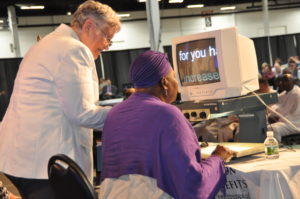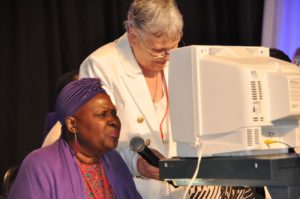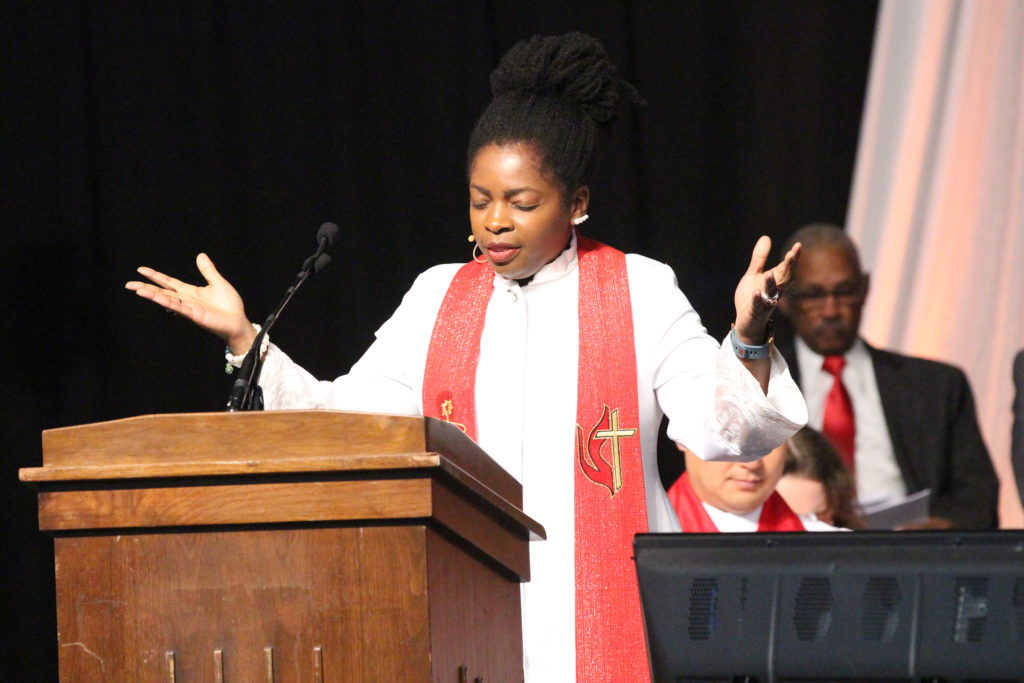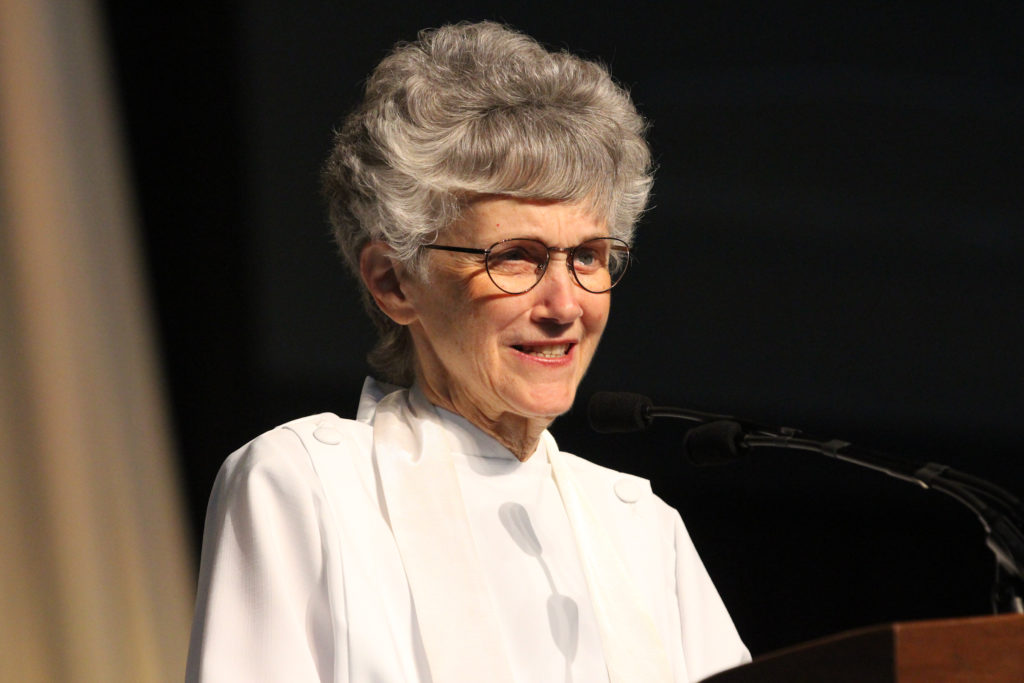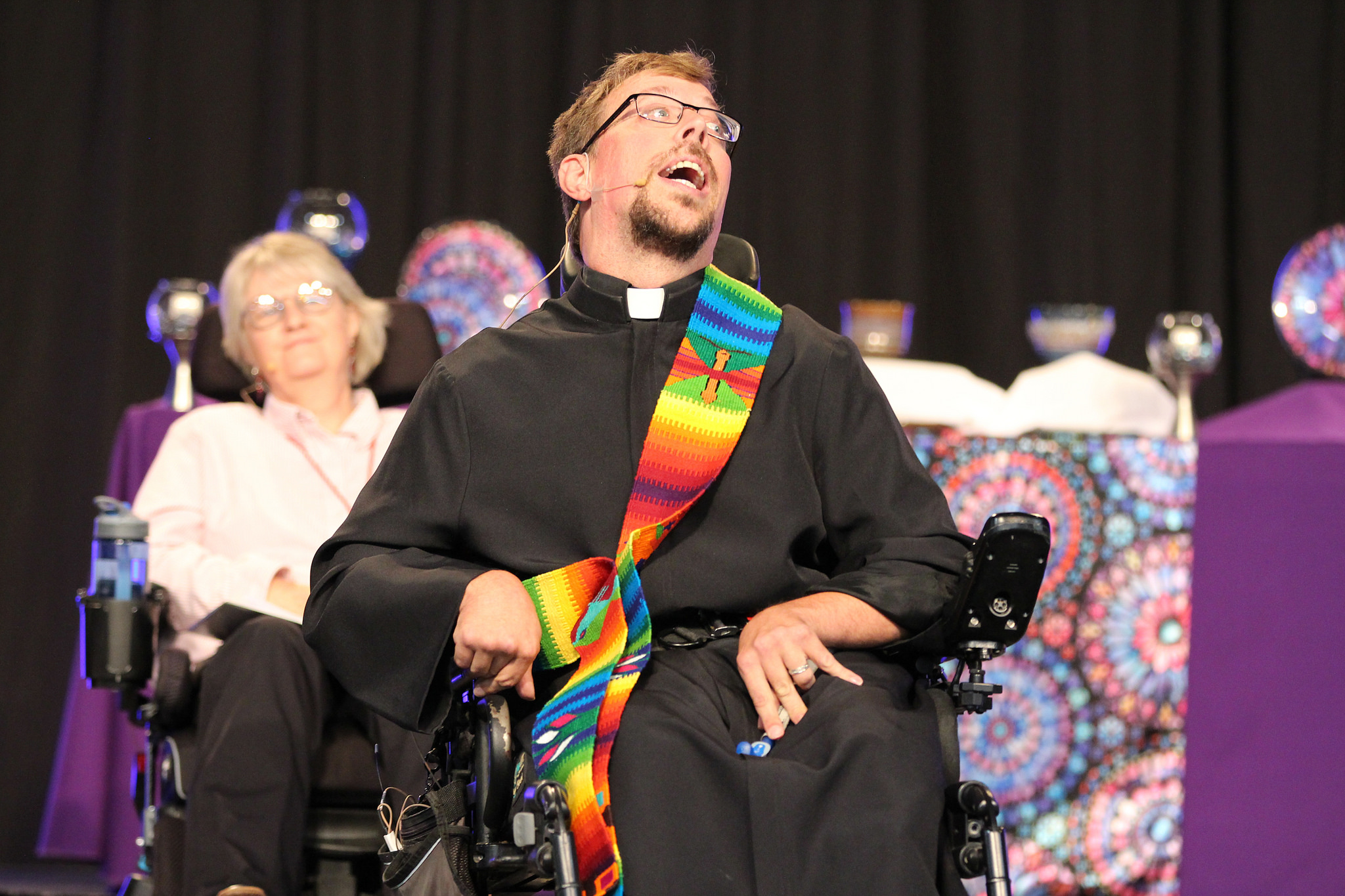
“Raise your expectations.” That is the Rev. Justin Hancock’s advice when asked what United Methodists can do to improve “disability ministry.” “You must have gospel-level expectations. That is when the world begins to change.”
That advice, offered during his sermon at the opening of the Eastern PA Conference’s 232nd Annual Session, June 14-16, might have reverberated silently throughout the two-day conference. Some of the sermons, speeches, historic resolutions and debates seemed to proclaim that same challenge to the nearly 900 members in attendance. (See the related story on Annual Conference resolutions.)
Indeed, the Opening Worship celebration offered a visual challenge to the usual expectations, as people using wheelchairs, an assistive reading device, sign language and other tools of intentional inclusiveness filled the stage to lead their peers in worship. It was a moment that moved even Hancock nearly to tears.
“You almost made me weep,” admitted the North Texas Conference deacon with cerebral palsy, whose own ministry models and advocates for creative ministry leadership among disabled people in the church. He may have been the first-ever deacon and disabled person to serve as the conference’s opening worship preacher. The UMC’s 2016 General Conference encouraged annual conferences to highlight disability ministry during one of their annual sessions, said presiding Bishop Peggy Johnson.
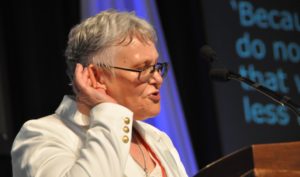 “We Will All Be Changed” was the overarching theme of this session. While drawn from the Apostle Paul’s end-times prophecy in 1 Corinthians 15:51, it may also signal raised expectations for critical changes looming on the denomination’s horizon at its Special Session of General Conference in 2019. Those changes may lead to separation or schism, despite the current emphasis on church unity.
“We Will All Be Changed” was the overarching theme of this session. While drawn from the Apostle Paul’s end-times prophecy in 1 Corinthians 15:51, it may also signal raised expectations for critical changes looming on the denomination’s horizon at its Special Session of General Conference in 2019. Those changes may lead to separation or schism, despite the current emphasis on church unity.
“We must be a church that accepts as many people as we can hold. We can’t afford to be picky, folks,” said Hancock, who brought and sold copies of his new book on disability ministry, The Julian Way.
“My friends with disabilities aren’t waiting on us,” he warned, urging churches to open up their leadership committees and chancel areas for wider participation. “They’re going to other places … to anyone who will accept them. They should be able to find a place in our church. If we are the body of Christ, we’re going to need all sorts of body parts.”
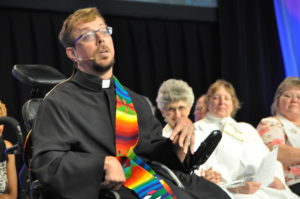 Hancock weighed in on the possibility that schism will result from the denomination’s ongoing controversy over sanctioning marriage and ministry for homosexual persons.
Hancock weighed in on the possibility that schism will result from the denomination’s ongoing controversy over sanctioning marriage and ministry for homosexual persons.
“I feel full inclusion will happen,” he asserted. “I believe Paul’s message is that no matter what disagreements we may have, we must remain unified under the cross of Christ.”
When Bishop Cynthia Moore-Koikoi said, “I see a little crazy in the church,” on the next night, during her Ordination and Commissioning Service sermon, she clarified that she was not referring to mental disability, which she understands well as a former school psychologist.
“There are times in the church when our thoughts or actions lack reason. There are times in the church when we say one thing and then do another, said the Pittsburgh Episcopal Area leader. “There are times in the church when we pray for something and then act against our own prayer. There is some crazy behavior in the church.”
To nodding heads and other signs of agreement, she cited numerous examples of churches being “double-minded” or divided about their reliance on God’s supply of resources, their true mission to “go and make disciples” and their willingness to welcome real change.
“We sing, ‘What a wonderful change has come over me,’” she said. “But try to change something in the church, and see how wonderful it is.”
She compared popular Bible verses with popular statements of resistance to change: “Scripture says, ‘I am about to do a new thing; now it springs forth, do you not perceive it?’ But we say, “We have never done it that way before.”
The first-term bishop is one of two African American female bishops who made history with their elections at the 2016 Northeastern Jurisdictional Conference. The other, Bishop LaTrelle Easterling of the Washington Episcopal Area, preached at last year’s Eastern PA Conference ordination service.
“God created this universe to be in a constant state of change,” Moore-Koikoi admonished the ordinands and commissionees. “God created individuals to grow, change, and evolve. God created organizations to grow, change, and evolve. God created The United Methodist Church to grow, change, and evolve.… Change is a blessing from God.”
Bishop Peggy Johnson, in her Memorial Service sermon, recalled the Apostle Paul’s message to the people of Corinth, as she also preached about change and raising expectations—then, now and in the age to come.
“This church was full of diversity and division, not unlike the church of today,” she explained. “He writes to them in order to clean up some bad teaching, to admonish the unruly, and to encourage the faithful.”
The bishop addressed families and friends of clergy and clergy spouses who died and entered “the church triumphant” over the past year. She encouraged them:
- to “trust the mystery” in Paul’s ultimate prophecy of inevitable change;
- to not fear death, which was destroyed by the power of Jesus; and
- to be “steadfast, immovable, excelling in the work of the Lord.”
Editor’s Note: Video recordings of the Annual Conference session, including these three sermons, are being prepared and organized for posting on our conference YouTube page. They will be added gradually, and the full set of videos should be available for viewing by July 12.
Also, please be sure to view many more dramatic, colorful photos of the worship services and other highlights of Annual Conference in several albums on our Flickr page.

